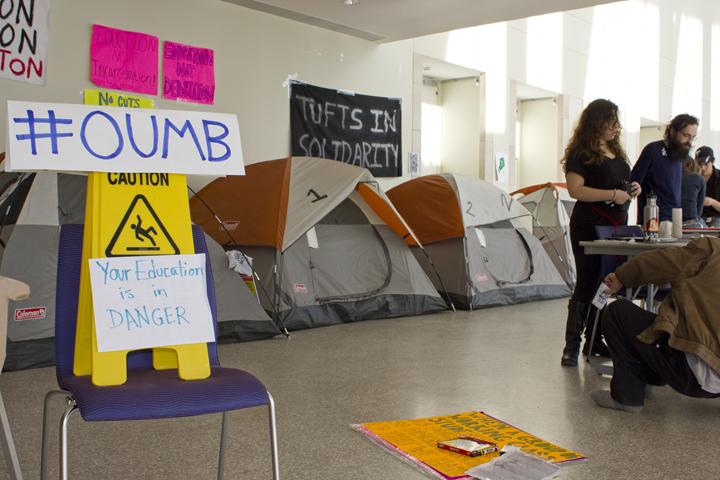The OccupyUMB movement sheds light on issues that reduce the accessibility of public higher education to residents in our community. Tuition hikes, parking fees, class sizes and co-insurance are issues that affect most of our students negatively. But I don’t believe the occupation will create change. Here’s why:
- The movement claims to represent UMB students without being democratically elected to do so, but it is fighting for a democracy.
- The movement seems to be about gaining political power on campus, instead of creating social justice.
- Getting more people to join seems to be a substitute for doing something that actually works. Dissent isn’t well received within the group.
- They can’t see that no one wants any message forced on them, whether or not they agree with it.
- The demographic of the group doesn’t match the demographic of UMass Boston (39% minorities and 60% women). The protesters are mostly white males. The protesters should reflect the demographic of students to truly be representative.
- Issues facing women, racial minorities, religious groups, and members of the LGBTQ community, etc., are often unacknowledged by occupiers unless it suits the purpose of creating an image of diversity and empathy for those groups. Being aware that those issues exist and holding a sign doesn’t mean one understands those problems.
- It’s a peaceful protest with pissed-off people.
- The slogans and chants used during protest oversimplify and dilute the importance of the issues they bring attention to. They don’t convey real information, and therefore don’t educate the students.
- Protesting at UMB most likely won’t divert funding from wars to public higher education. I think the problem is much larger than UMB and rising costs is a symptom.
My solutions:
- Less slogans, more facts. Find out where exactly our money is going.
- Don’t blame the administration’s salaries on fee hikes.
- Know that these problems are not the only problems that students have. Understand students’ time constraints and reasons why they can’t take part in the movement.
- Talk to students; listen without the intent to solicit them.
- Listen to all opinions. An environment that doesn’t accept dissent isn’t democratic.
- Create dialogue with administration and attend their meetings. They’re not blood-sucking vampires (I hope); they’re people.
Message to the Occupiers:
Do you want to help people, or do you want to change people? Helping involves providing access to the things people need to improve their lives by their standards, not yours. Changing involves having them alter what they believe and/or what they do. Does helping someone have to involve changing them? People can be helped without challenging their beliefs or expecting anything in return (such as participation in rallies or speak outs), especially when their beliefs don’t conflict with the cause.
Many students are negatively affected by UMB’s costs and want to create change. They may not, however, want to become activists because some activist groups on campus seem to have the agenda of changing the political beliefs of participants instead of bringing social justice. The groups also tend to make all activist events about recruitment into their organization and not about the cause itself. This is a huge turn-off.
I respect the occupiers’ passion. I just don’t believe occupying is the way to bring change.

